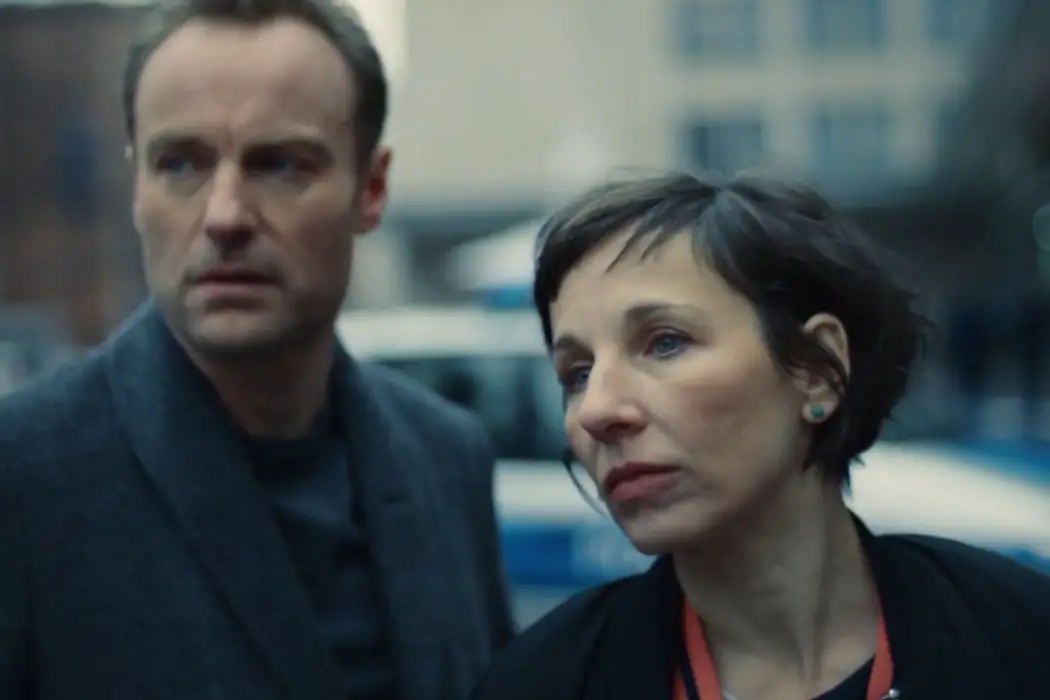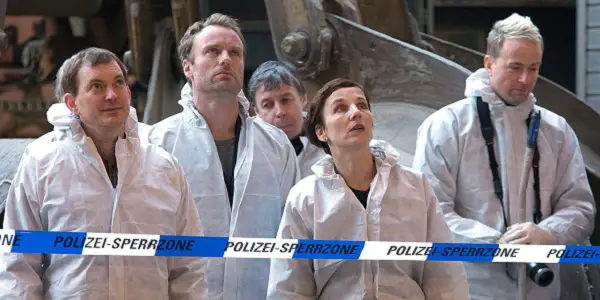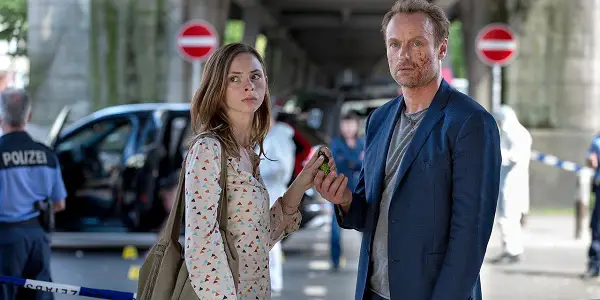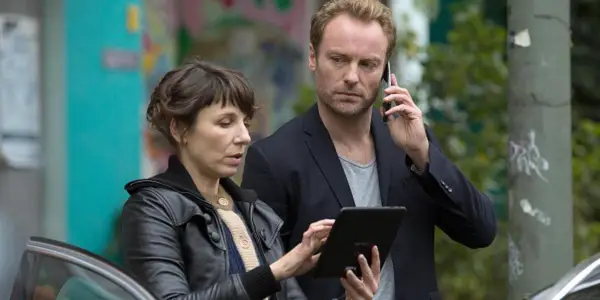TATORT: STREETS OF BERLIN: Crime Scene Shenanigans Straight from Germany

Lee Jutton has directed short films starring a killer toaster,…
On the surface, it’s easy to label the long-running crime drama Tatort as “the German Law & Order.” Yet to do so glosses over what makes Tatort such a uniquely bizarre cultural institution. Tatort — German for”crime scene” — has been running continuously since 1970 (and with the same campy theme song, too). A collaborative effort across regional television studios in Germany, Switzerland, and Austria, different cities shoot their own versions of the show starring their own particular investigative team; one week Tatort might be in Munich, the next week it might be in Zürich, the next in Dresden. Each regional studio only contributes a few feature-length episodes of Tatort each year, which means it might be months before you can get caught up with your favorite investigators again. But in return, one gets exposed to the various cultural quirks and landmarks that make each city special.
Tatort is one of my biggest guilty pleasures in entertainment. As someone who has visited Germany multiple times, I love being able to hop around the country with the different investigative teams. I’m also a sucker for a good murder mystery. Yet as someone who believes in abolishing the police, I’m also aware that it appears to go against my beliefs to be obsessed with a German cop show. Personally, I would argue that Tatort is not the obvious copaganda you might assume it to be, for the very reason that constitutes my main obsession with the show: the cops on Tatort are all insane, and most of the time, it feels like they are committing more crimes on the show than the criminals that they’re following. The havoc they wreak in each episode often results in them being reprimanded, hospitalized, or a combination of both. One doesn’t finish an episode of Tatort liking cops so much as laughing at them.
My favorite current set of detectives on Tatort fit this bill to a T, and good news: the vast majority of their episodes are coming to the international entertainment-focused streaming service MHz Choice. Nina Rubin (Meret Becker, who Netflix fans may know from her supporting role in season three of Babylon Berlin) and Robert Karow (Mark Waschke, who played the nefarious Noah on Netflix’s Dark) are partners in the homicide unit of the Berlin police. Naturally, they have different tactics that cause them to butt heads—and naturally, they also have a lot of chemistry that makes one wonder when they’re just going to hop into bed already. But most importantly, everything they do and say is absolutely ridiculous. There’s no better way to get introduced to the wild and weird world of Tatort.
Double Trouble
Rubin and Karow’s first episode of Tatort aired in 2015; since then, they have starred in twelve installments, the first eleven of which are being made available on a weekly basis on MHz Choice. Each installment, much like every other iteration of Tatort, involves them investigating a crime that is confined to the episode amidst an overarching story that extends beyond it, ensuring that one remains invested in their misadventures even when they disappear from one’s television screen for months at a time. In the first four episodes of Rubin and Karow’s story—dubbed Tatort: Streets of Berlin on MHz Choice—that mystery concerns the murder of Karow’s previous partner in the narcotics unit.

When we first meet Karow, he has just been transferred from narcotics to homicide with a cloud of suspicion lingering in his wake. A prickly character who is willing to do pretty much anything for his job, and rumored to have been engaged in an adulterous affair with his partner’s wife, Karow remains a vague suspect in the man’s death. His new partner in homicide, Rubin, is a Jewish wife and mother who often neglects her familial duties for her job—not to mention, her love of going out to Berlin nightclubs and engaging in back-alley sexual activity with her dance partners. (Literally the first time we meet Rubin, she’s reapplying her mascara in a crowded club bathroom before going outside and getting bent over the back of a car). So, you know, she’s not exactly free of baggage either—in other words, they’re a messy match made in Tatort heaven.
Naturally, the two of them are in conflict almost immediately. Karow is a loose cannon who often embarks on solo missions that, while helpful to the case, breaks every rule in the police handbook, which infuriates Rubin. And, while Karow is willing to make certain sacrifices in order to catch a major culprit—in the first episode, “The Mule,” he’s less concerned with finding a missing teenage girl being used for drug trafficking than with finding the head honcho of the whole trafficking operation—Rubin’s emotions tend to guide her decision making. Essentially, where Karow is led by his head, Rubin is led by her heart.
Danger Zone
Amidst their attempts to find that teenage girl before the bags of drugs in her stomach accidentally explode, or to identify the decomposing bodies buried on a construction site inside oil drums, Karow is also trying to clear his name from suspicion of his partner’s death—and he asks Rubin to help him. While she is initially just as suspicious as anyone else of Karow’s involvement, eventually she is won over by her partner’s prowess in the field, not to mention the substantial evidence he accumulates that the partner was murdered by a mysterious Berlin criminal mastermind known only as Hakari.
One doesn’t have to wait too long to learn who Hakari is; their identity is revealed by the end of episode four, “Dark Field,” one of the more interestingly structured episodes of Tatort I’ve ever seen. It’s the day of the bar mitzvah of Rubin’s youngest son, and the police activity throughout the episode is intercut with scenes from the ceremony. However, Rubin, as always, is lured away from her family on this very important day: first, because the witness that Karow is transporting is murdered before they arrive at police headquarters, and second, because shortly afterward both Karow and his deceased partner’s wife disappear.

The rest of the episode mostly consists of Rubin and plucky intern Anna—played by the excellent Carolyn Genzkow and quite possibly the most competent person in the entire Berlin police force—trying to track them down, Rubin dressed the entire time in the little black dress that she threw on for the bar mitzvah. Because “Dark Field” is so focused on Karow and Rubin and the way the conflicts inherent in their personal and professional lives are so often intertwined, it’s far more fascinating than some of the more paint-by-numbers mysteries the two investigate together. (Such as episode three, “We-You-They,” in which a group of obnoxious teenage girls run over a woman with a car and it frustratingly takes the entire 90-minute episode to get them to admit it.) It’s also the first one where they truly feel like partners, and partners willing to risk their lives for each other at that.
Police Story
Berlin is one of the more ethnically diverse cities in Germany, so it makes sense that not everyone in Tatort: Streets of Berlin—from the police force to the criminals—is a stereotypical white German. Yet dealing with these non-white characters and their cultures is one way in which Tatort flails about a bit, trying to seem modern while also often succumbing to tired stereotypes. For instance, almost every single character of Middle Eastern descent has something rude to say about Rubin being Jewish, and while one could chalk this up to the show trying to realistically depict the often-tense relations between those of different religions in Germany, it feels like a lazy bit of shorthand being used in place of real character development. However, episode two, “Corrosive,” which deals with those aforementioned dead bodies on the construction site, surprises in the way it manages to sensitively handle the story of a family of illegal immigrants, showing how the system is more at fault for their immigration status than any nefarious activity on their part.

But the real strength of Tatort: Streets of Berlin has nothing to do with the writing or the direction of the show, even when both of those are at their best (read: most outrageously unbelievable). It’s all about Becker and Waschke, who are both excellent actors blessed with natural charisma that makes them a joy to watch even as they do stupid stuff—not to mention, they have a great deal of chemistry. In one episode, hidden cameras that Karow has planted in his own apartment clear his name by revealing that the murder weapon found in his apartment was actually planted there by a male conquest; when the rest of the homicide squad gather around a computer to giggle at the pornographic footage, Karow calmly appears and tells the main instigator that he’s just jealous. When Rubin apologizes for the way the rest of the team acted, he dismisses their ridicule as “fear of penetration.” (Because this is Germany, one shouldn’t be surprised that there’s a lot more graphic sex and violence than one would expect on a show airing in primetime on a major network in the U.S.)
Karow’s casual, matter-of-fact attitude towards his bisexuality—he’s not going to go out of his way to flaunt it, but he sure as hell isn’t going to hide it either—is refreshing, especially when the character in question is a middle-aged man. The same goes for Rubin with her exposed tattoos and unabashed fondness for going out dancing while dressed like someone twenty years younger. In lesser hands, these story elements might feel like mere surface traits applied to make the characters seem edgier, but Becker and Waschke make these character traits feel absolutely authentic. Becker, a musician whose punk-rock sensibility bleeds through in her depiction of Rubin, is set to depart Tatort in 2022, and while I’m sure that whatever she turns her talents to next will be worthwhile, it’s hard to imagine anyone being able to fill her shoes alongside Karow in Berlin.
Conclusion
There’s no better scene to sum up the tone of Tatort: Streets of Berlin—and Tatort in general—than the bit in “Dark Field” where Karow lures one of his captors over to him so that he can take a big bite out of his year. Blood dribbling down his smirking face, one can’t help but laugh at the whole bit, especially when it’s revealed that Karow wasn’t just trying to snack on some cartilage, he was trying to obtain the man’s earring so he could use it to pick the lock on his handcuffs. The entire sequence is absolutely absurd and yet somehow, it works—so, you know it’s just quintessentially Tatort.
What do you think? Are you familiar with Tatort? Share your thoughts in the comments below.
Tatort: Streets of Berlin debuts on MHz Choice with “The Mule” on August 17, 2021. You can see when the rest of the episodes will be available here.
Does content like this matter to you?
Become a Member and support film journalism. Unlock access to all of Film Inquiry`s great articles. Join a community of like-minded readers who are passionate about cinema - get access to our private members Network, give back to independent filmmakers, and more.
Lee Jutton has directed short films starring a killer toaster, a killer Christmas tree, and a not-killer leopard. Her writing has appeared in publications such as Film School Rejects, Bitch: A Feminist Response to Pop Culture, Bitch Flicks, TV Fanatic, and Just Press Play. When not watching, making, or writing about films, she can usually be found on Twitter obsessing over soccer, BTS, and her cat.













